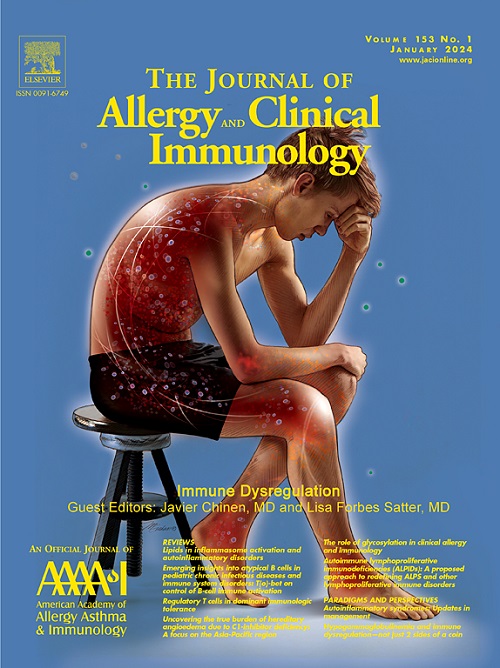Trained immunity–based vaccines for infections and allergic diseases
IF 11.4
1区 医学
Q1 ALLERGY
引用次数: 0
Abstract
Trained immunity has emerged as a new concept in immunology that is associated with the memory of innate immune cells and linked to specific metabolic and epigenetic reprogramming of these cells. Trained immunity may confer nonspecific and sustained protection against a broad range of pathogens, and recent findings show that it might also be involved in allergy mechanisms. Some conventional vaccines have demonstrated trained immunity induction as the mechanism underlying their heterologous protection. The development of novel vaccines designed especially for this purpose (trained immunity–based vaccines) might be useful in the absence of conventional vaccines or in specific clinical settings. Under certain circumstances, trained immunity could lead to persistent inflammatory innate immune cell responses in subjects with allergy, which could be associated with the development and worsening of allergy by promoting and amplifying aberrant type 2 immune responses. In other cases, trained immunity may help promote healthy immune responses to allergens, such as type 1 responses that counterbalance the type 2 inflammation or regulatory T cells that induce tolerance. Trained immunity–based allergen vaccines could become the next generation of allergen-specific immunotherapy vaccines, harnessing the potential of trained immunity to induce allergen tolerance. The identification and characterization of proper training inducers might well pave the way for the development of novel immunotherapies.
针对感染和过敏性疾病的训练免疫疫苗。
训练免疫是免疫学中出现的一个新概念,它与先天性免疫细胞的记忆有关,并与这些细胞的特定代谢和表观遗传重编程有关。训练免疫可针对多种病原体提供非特异性的持续保护,最近的研究结果表明,训练免疫也可能参与过敏机制。一些传统疫苗已证明训练免疫诱导是其异源保护的基本机制。专门为此目的设计的新型疫苗(基于训练免疫的疫苗)的开发可能会在没有常规疫苗的情况下或在特定的临床环境中发挥作用。在某些情况下,训练免疫可能会导致过敏受试者出现持续的先天性免疫细胞炎症反应,通过促进和扩大异常的 2 型免疫反应,从而导致过敏的发生和恶化。在其他情况下,训练免疫可能有助于促进对过敏原的健康免疫反应,如平衡 2 型炎症的 1 型反应或诱导耐受的调节性 T 细胞。基于训练免疫的过敏原疫苗可以成为下一代过敏原特异性免疫疗法疫苗,利用训练免疫的潜力诱导过敏原耐受。识别和鉴定适当的训练诱导剂很可能为开发新型免疫疗法铺平道路。
本文章由计算机程序翻译,如有差异,请以英文原文为准。
求助全文
约1分钟内获得全文
求助全文
来源期刊
CiteScore
25.90
自引率
7.70%
发文量
1302
审稿时长
38 days
期刊介绍:
The Journal of Allergy and Clinical Immunology is a prestigious publication that features groundbreaking research in the fields of Allergy, Asthma, and Immunology. This influential journal publishes high-impact research papers that explore various topics, including asthma, food allergy, allergic rhinitis, atopic dermatitis, primary immune deficiencies, occupational and environmental allergy, and other allergic and immunologic diseases. The articles not only report on clinical trials and mechanistic studies but also provide insights into novel therapies, underlying mechanisms, and important discoveries that contribute to our understanding of these diseases. By sharing this valuable information, the journal aims to enhance the diagnosis and management of patients in the future.

 求助内容:
求助内容: 应助结果提醒方式:
应助结果提醒方式:


